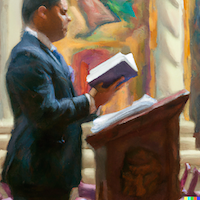Ministries Lectors
The Catholic Church, rich in its traditions and roles, recognizes the indispensable role of Lectors, also known as Readers, who serve the liturgy by proclaiming the Word of God during the Mass. Lectors play a pivotal role in Catholic worship, as they bring to life the scriptures during liturgical celebrations, fostering an active engagement with God's Word.

The Ministry of Lectors is rooted in the early Church, where the reading of scriptures formed a core part of community worship. Today, Lectors continue this ancient tradition, proclaiming the First and Second Readings during the Liturgy of the Word, as well as the Responsorial Psalm and the Prayers of the Faithful when a deacon or cantor is not present.
Lectors are individuals of faith and devotion, chosen for their ability to communicate God's Word clearly and meaningfully. They must have a deep understanding and respect for scripture, a good speaking voice, and the ability to read publicly with conviction and understanding. Beyond merely reading, the goal of a Lector is to help the congregation break open the Word of God, making the readings resonate in the hearts of those listening.
The ministry requires preparation, both spiritual and practical. Spiritual preparation involves prayer and reflection on the scripture passages to be read. Practical preparation involves understanding the text's context and practicing the pronunciation and phrasing, ensuring that the Word is effectively communicated to the assembly.
In performing their duties, Lectors remind us of the vitality of God's Word. Their ministry is not only about the ability to read aloud but also about the faith, dedication, and reverence for the scriptures. Their role helps foster a love for scripture among parishioners, encouraging them to delve deeper into God's Word.
As we recognize and appreciate the Ministry of Lectors, we are reminded of the power and beauty of God's Word in our lives. The Lectors, through their dedicated service, inspire us to encounter God more deeply in scripture and bring us closer to understanding His message. In so doing, they contribute immensely to the richness of Catholic liturgical life and the spiritual nourishment of the faithful.